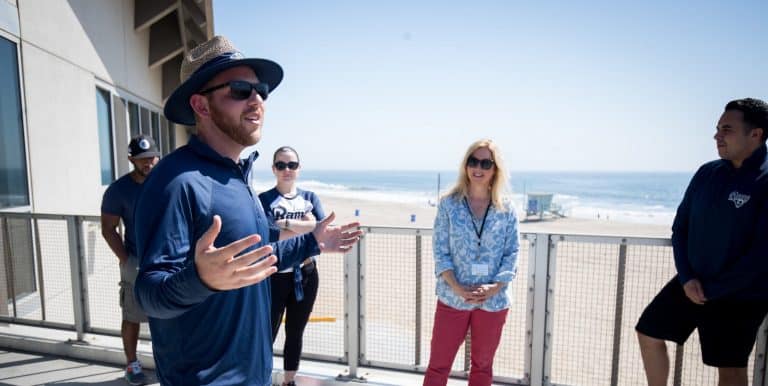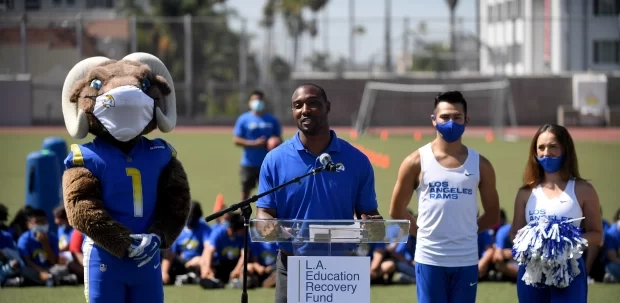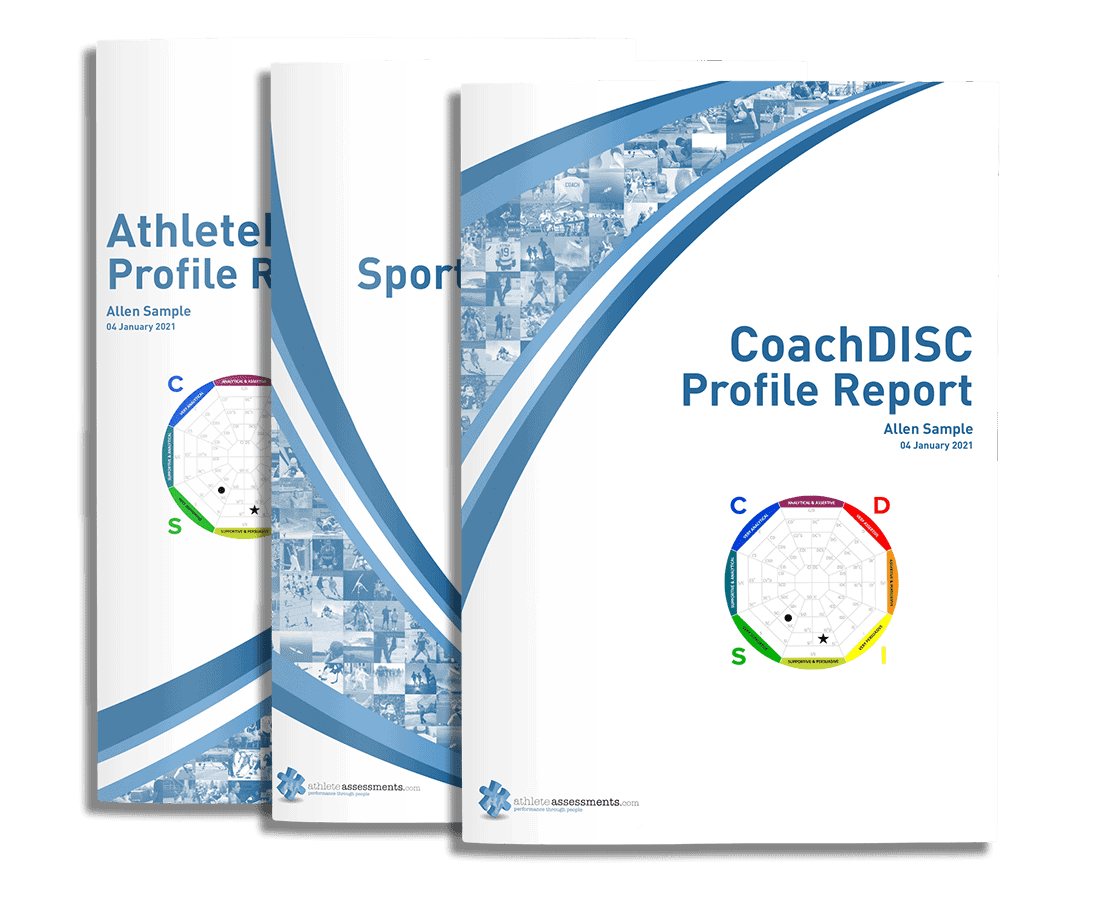The Super Bowl LVI, the game that delivered on every promise from a season of hard-fought competition, saw the Los Angeles Rams score the final touchdown with just two minutes left on the clock to take the win. Against the backdrop of a thundering home-crowd stadium, they created history to not only host and win the NFC championship, but host and win the Super Bowl too. But a lesser-known thundering roar, fueled by the echoes of the “Whose house? Ram’s house!” chant, is building throughout the Los Angeles community due to the championship winning work of the LA Rams Community Affairs and Engagement team.
“It’s incredible. I think we can all see just watching the game, the excitement of the players and just being a champion, but even taking a step back, the impact this has had on the community. It has helped us with our goal of transforming communities, impacting lives, and providing hope within the Los Angeles region. It’s been so much fun to see this city smile,” shared Johnathan Franklin, Director of Social Justice and Football Development for the LA Rams. Johnathan brought his passion for the sport and community, and previous playing experience as a running back for the Green Bay Packers, to the organization alongside their move back to Los Angeles in 2016.
For most fans and football lovers, if we are lucky, a Super Bowl win comes once in a lifetime and even just holding onto the memory of that feeling will have a lasting impact. For the team at the LA Rams, this win has also created a unique opportunity to continue to broaden and deepen their level of engagement with the Los Angeles community.
Since the Rams moved to LA they have been extending their reach within the community. Collaborating with non-profit organizations, getting involved with social justice issues, community-police relations, criminal justice, food insecurity, homelessness, and education inequities to name a few areas. Their approach is always to listen, learn, and respond. That means listening to community members, non-profit leaders, and key stakeholders to first understand what’s needed. Then, with their desire to be one of the greatest community partners, the Rams build a tailored, strategic program to systemically address each need.
Since the Super Bowl win in February this year, David Weingarten, Manager of Community Affairs and Engagement and a masters graduate of the University of Washington’s pioneering program in sport leadership, has seen an added layer of excitement at events in the communities that he works with. He shared, “Whenever we visit local schools, the students are all wearing their Rams t-shirts, and everybody knows the chant.”
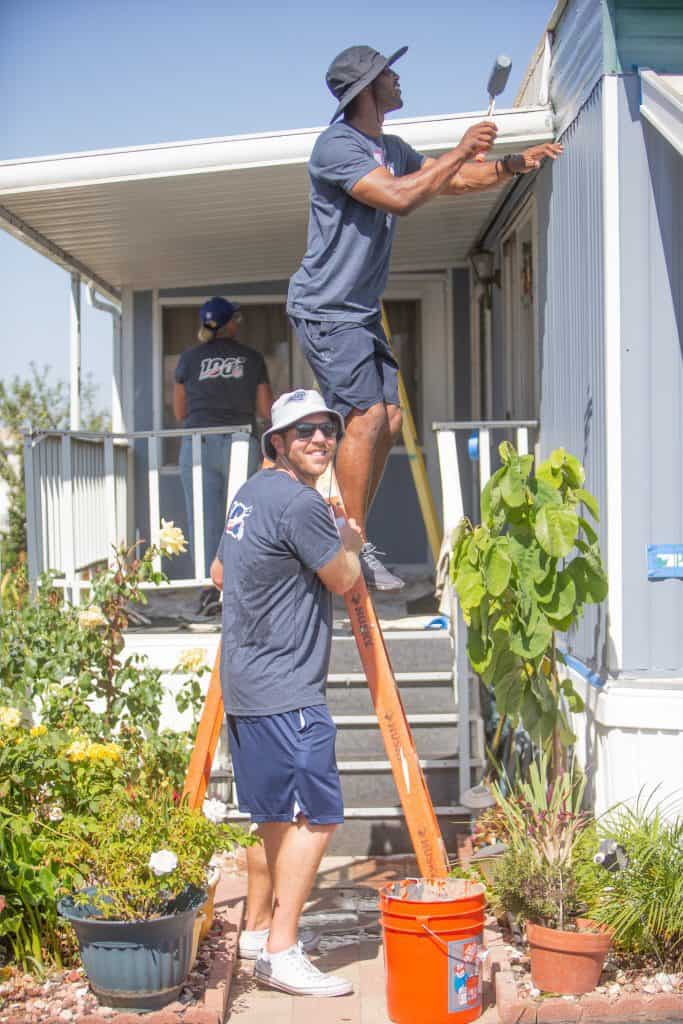
David also added that the win has made it easier to connect and engage the community, particularly at a school level,
“We’ve got a generation of elementary and middle school students who have grown up without a football team in LA, and they now have their own hometown championship team to root for.”
A foundational element of the Rams community outreach and engagement plan has been the Pathways to Success Program. This program was designed to create opportunities for LA’s high school students, as the Rams’ own direct experience coupled with community feedback, showed there is a distinct lack of access for students within the inner city. Johnathan shared,
“We will not allow the zip code that students grow up in to be a limitation. We want to break those barriers.”
Drawing on internal and external expertise, feedback, and experience, the Community Affairs and Engagement team designed and delivered a tailored experience to create relevant and meaningful opportunities for students in the inner city. The four-month long Pathways to Success Program, now going into its second year, gives participants from local high schools the opportunity to experience the professional responsibilities and job roles that sit behind an organization like the Rams. They may or may not be aware of what careers exist within the organization such as marketing, broadcasting, or community engagement. The ability to see the behind-the-scenes roles that contribute towards a sporting organization broadens participants’ perspectives on what a career in sport can look like, beyond the roles they see out on the field. Many young people often think that because they didn’t ‘make the team’, careers in sport are no longer an option for them, and often their understanding of career opportunities is also limited to what they are exposed to in their own life or family.
David shared,
“I remember myself in high school and people asking me what I wanted to do with my life and saying, ‘I want to work in sports, in operations’. But at that time, you really don’t know, at least for me, what operations means, what does it look like. In high school, it’s very broad thing to say ‘I want to work in sports’, and so the hope with this program is that we can really break it down for these students and help give them more of a focused approach. We can expose them to all these different pieces and elements of sport, and from there it’s up to them to decide and we’re here to support them along the way.”
While the highlight of the program for participants was undoubtedly joining their mentors for first-hand insight into their roles on a Rams game day at the SoFi Stadium home ground, the Pathways to Success Program is much more than a job shadow experience. It is anchored by life shaping workshops targeting financial literacy, self-discovery, and goal setting. These skills are often neglected in a young person’s development, when really, they can be the defining factor of a career developing or halting, and importantly, they combine to create a pathway to success. For the self-discovery component, the Rams bring in Athlete Assessments’ expertise to guide participants in the process of learning about themselves.
A core use of Athlete Assessments’ DISC Profiles is to build self-awareness, while also providing the opportunity to understand others to build better interpersonal relationships and ultimately increase performance in any environment. Each student and mentor in the program completed their own individual DISC Profile, before Bo Hanson, 4x Olympian and Founder of Athlete Assessments, debriefed the group on their individual results and how to apply them within the various contexts of their day-to-day lives.
Johnathan shared that understanding who you are first, is a critical component of carving out a career for yourself, and that the inclusion of this in the program was positively received by participants, he added, “Post program surveys show that the component of self-discovery was one of the most popular elements of the program. The self-awareness workshops were scheduled very early in the program as the skills developed in the sessions underpin the very way people interact with one another! Feedback consistently says that people wished they had the benefit of developing their self-awareness skills earlier.”
The program specifically chose to use our Sports ManagerDISC Profile, even though some of the participants are athletes, as they wanted to demonstrate that this is a tool used in the sports industry by professionals. With the combination of the mentors completing their own DISC Profile alongside real work insights, the entire experience for the students was enhanced. Through the awareness of their DISC Profiles, participants came to understand (among other things) the value they could add to a project, what they each brought to the group, and how they could own a role by working to their strengths. There were plenty of a-ha moments as participants recognized themselves and each other in the behaviors highlighted in their DISC Profiles, as well as in the roles of different mentors.
Bo shared after the session,
“It’s an exciting and refreshing program to be a part of, and it reinforced all the reasons why we use DISC and do what we do. The engagement from both the mentees and mentors throughout the session demonstrated a keen interest and desire to want to further their understanding, and develop their awareness of themselves and each other, and we’re looking forward to continuing to contribute to the program in the years to come.”
IMAGE: © HANNA YAMAMOTO / LA RAMS
Johnathan explained how their decision making around mentors in the program, followed the George Floyd tragedy, where social justice dialogues were being held in every department of the Rams. This gave the Community Affairs and Engagement team an opportunity to understand the emotional current within the organization. Factoring in this internal feedback and teaming it with external knowledge, the team designed the mentor role in the Pathways to Success Program to be a meaningful connection and a guiding influence which will continue to be a force in participants lives, long after the formal component of the program is complete. While the mentors are incredibly busy with their in-season responsibilities, each of them shared the desire to put action behind their intention and help create pathways for the students coming into the program.
The same standards and values that led the Rams to the Super Bowl LVI win are alive within the whole organization, easily observing their recognizable commitment to exceptional performance. Providing insights into their plans to continue to build the program, David said, “Not only do we want to see it grow in terms of the numbers of mentors and mentees, but we also want to see a deepening of that connection to the Rams.”
The map for future programs will see students maintain their connections and networks, long after the program is finished. David shared that their plan is to develop the experience into an opportunity to then intern during training camps or be involved and volunteer with the community service team. As a result, participants will be able to interview for an internship, whether for a season or the full experience with the team.
When asked to share what he most looks forward to in continuing the program, David said, “Seeing that we were able to impact participants thinking and provide new perspectives. The program is still in its early stages, but we hope that this is something that we’re able to sustain at the Rams for many years to come. We hope to turn it into something where students who are interested in the sports industry can engage with our organization and benefit by learning about what goes on behind the scenes.”
“We also hope that it’s something that will give people an opportunity to get their foot in the door with a professional sports team and gain opportunities that they might not have had before.”
Johnathan and David both joined the Rams in the move back to Los Angeles in 2016, with just a few people in the entire organization. In just six years that number has grown substantially, but the expansion is more than just quantitative. As different departments are being added, the diversity among the people working for the Rams continues to grow. Jonathan shared, “We are really being intentional in our hires and winning with our people. We are creating pathways and pipelines internally for people to have opportunities to become executives. We want them to have the autonomy to go out and create, be innovative in their thinking, and in their implementing of programming. Through the LA Rams we have an opportunity to be a resource and change the trajectory of people’s lives.”
Johnathan and David were both so generous sharing their thoughts. They gave us great background for us to really get a feel for the way things work at the Rams. We could only fit a fraction of the content into this article. To read more, we encourage you to visit our dedicated articles about both Johnathan Franklin and David Weingarten.
Where to from here?
Having the knowledge of what a career in sport looks like beyond the field is important for anyone who is making decisions about their potential career pathways, or even someone thinking about potentially changing careers. A defining factor of personal performance and career progression is understanding the basics of people management, interaction, and the importance of self-awareness. Athlete Assessments’ DISC Profiles provide athletes, coaches, and sports professionals at any level or stage in their career, with the necessary tools to enhance their understanding of themselves and others.
Our online library includes articles detailing the way our clients apply and use our suite of DISC Behavioral Profiling tools to enhance their own and others’ performance. If these articles generate any questions for you, please just reach out and contact us. We would love to help you be your best.
LOVE THIS ARTICLE?
DOWNLOAD YOUR FREE, PRINTABLE PDF COPY BY FILLING OUT THE FORM BELOW!
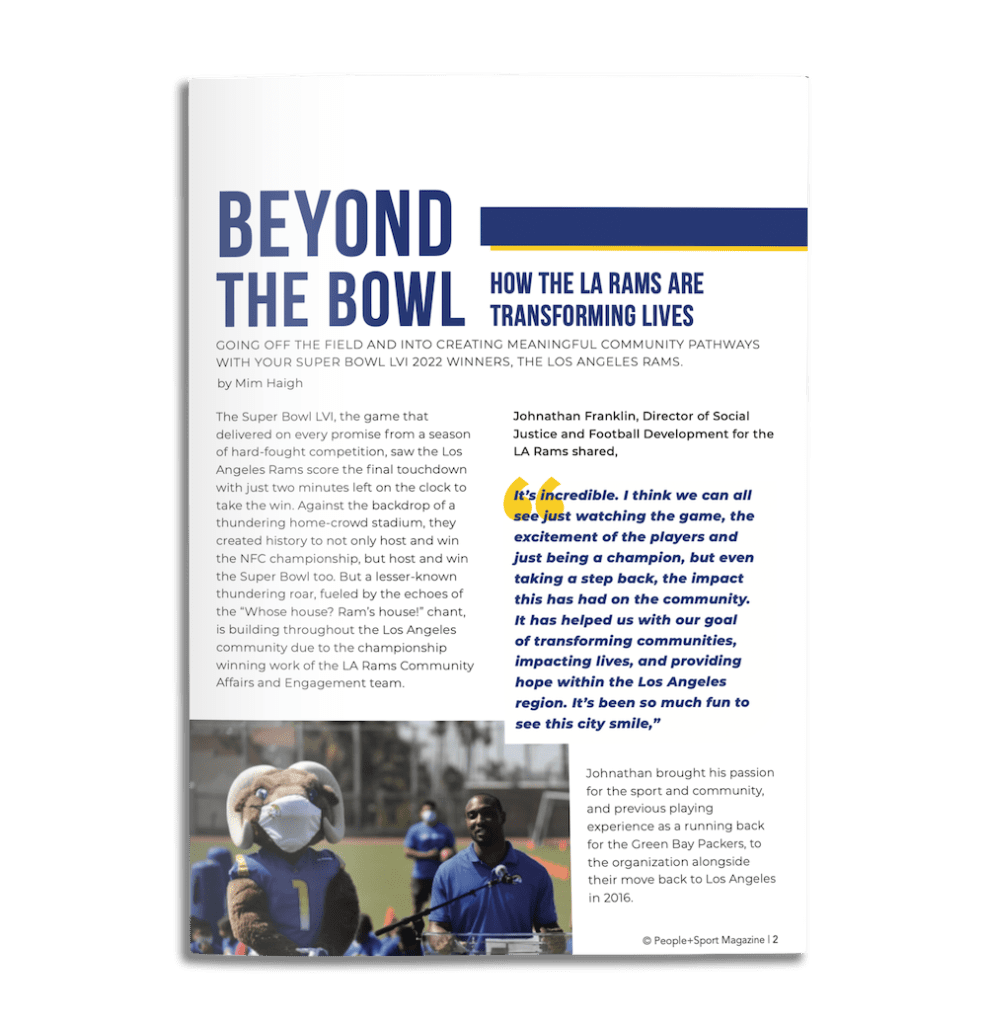
Recommended Articles
David Weingarten, Manager of Community Affairs and Engagement at the Los Angeles Rams, on creating your own timing by taking a chance, and what being a graduate of the University of Washington Intercollegiate Athletic Leadership Masters’ Program can look like.
Johnathan Franklin, Director of Social Justice and Football Development for the Los Angeles Rams, on life-altering instances, laying the foundations for your future, and the importance of community outreach in sport.
Dr LaTisha Bader, Certified Mental Performance Consultant on using Athlete Assessments’ DISC Profiling to develop self-awareness and team chemistry.
Coaching and successfully developing elite athletes requires dedicated attention to mental skills development – self-awareness, self-belief, identity and resiliency, skills which benefit athletes in competition and in life. Kyle McDonald, Mental Performance Coach, General Manager and Performance Director of the Weyburn Gold Wings, shares the process of mental skills development


